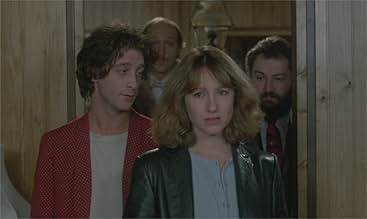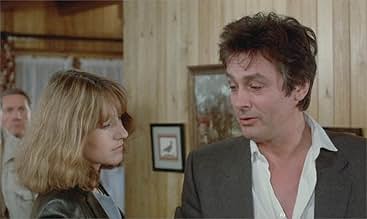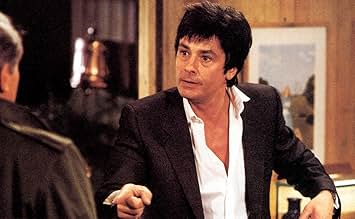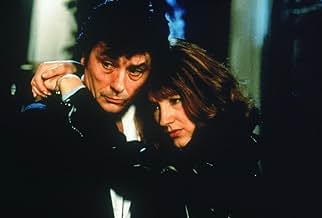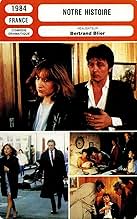AVALIAÇÃO DA IMDb
6,3/10
1,3 mil
SUA AVALIAÇÃO
Adicionar um enredo no seu idiomaA desperate alcoholic reaches a turning-point in his life when he meets a strange woman in a railway carriage: they make love, but then she leaves. Chasing after the girl, he clings to her a... Ler tudoA desperate alcoholic reaches a turning-point in his life when he meets a strange woman in a railway carriage: they make love, but then she leaves. Chasing after the girl, he clings to her as if she were his final chance.A desperate alcoholic reaches a turning-point in his life when he meets a strange woman in a railway carriage: they make love, but then she leaves. Chasing after the girl, he clings to her as if she were his final chance.
- Prêmios
- 2 vitórias e 3 indicações no total
Jacques Pisias
- Fred
- (as Firmin)
Avaliações em destaque
This film is just about unclassifiable. What rubric do we put it under: melodrama, comedy, political satire, Pirandellian experiment? What is clear is that Alain Delon goes further towards demolishing his sexy warrior image than he ever did before or since. Here is an extroverted actor at home playing cops or gangsters, the only French actor I know who could team with Charles Bronson in a thriller and bring it off, and here he is playing a cheerless, withdrawn alcoholic garage owner. There is hardly any plot to hang on to, just a series of vignettes with characters describing their various joys or troubles. Somebody should have told Bertrand Blier that assembling 20 or so people in a house and getting them to philosophize is NEVER funny.
Delon does his new persona very well, and deserved the César award he got. Nathalie Baye has a big part, playing three different women, and is always funny and touching. The other players have much less interesting things to do, and the picture is overlong at 1hr.50min.
Delon does his new persona very well, and deserved the César award he got. Nathalie Baye has a big part, playing three different women, and is always funny and touching. The other players have much less interesting things to do, and the picture is overlong at 1hr.50min.
At first, the impression to discover a collaboration between Pasolini and Fellini.
Then - the touch of Pirandello.
At final, a fairy tale , in modern aspects reminding old fashion Middle East stories.
In fact, a beautiful job of Nathalie Baye and Alain Delon. Especially alain Delon, offering a character just eccentric for his long career.
Provocative ? Not exactly. Only a story of love, illusions and adventures reminding so many cultural islands than it seems a revision of them. Poetic, bizarre and well crafted reflections of love dream, furies and angries and pieces of obsession for ideal of a sort of Don Quixote interpreted by the sex symbol of french cinema.
Then - the touch of Pirandello.
At final, a fairy tale , in modern aspects reminding old fashion Middle East stories.
In fact, a beautiful job of Nathalie Baye and Alain Delon. Especially alain Delon, offering a character just eccentric for his long career.
Provocative ? Not exactly. Only a story of love, illusions and adventures reminding so many cultural islands than it seems a revision of them. Poetic, bizarre and well crafted reflections of love dream, furies and angries and pieces of obsession for ideal of a sort of Don Quixote interpreted by the sex symbol of french cinema.
Please don't get me wrong - I like this movie. It is pure 80's French romantic cinema, has two excellent leads, and like the Flic flicks of the time, has relevant modern themes. It is, however, deeply flawed.
"Notre Histoire" is a classic example of a movie in which an established director carries out all the mistakes he should have shaken off at film school. For instance, Blier is the only director I know who doesn't know how to use music effectively - music is just slotted in at random points, and very unsuitable points at that.
Like a lot of Blier's work, this is a film of confusion, alternative reality and twisted takes on what we call normal life. Its' characters change persona, distance becomes meaningless, relationships blur - yet the film's final few seconds puts everything - and I do mean EVERYTHING - into sharp context.
Essentially, this is a vehicle for Alain Delon, but it's nowhere in the same league as Le Samourai. It's Delon - the King of 60s Cool - playing Robert, a middle-aged man in crisis; yes, playing against type! His marriage is on the rocks, but being Delon, he attracts the attention of wayward young mother Donatienne (Baye). After a fleeting assignation on an SNCF train, Robert won't let go. Donatienne is the woman for him, and he won't give her up! To hell with the marriage, the job, the house, the normal life - let's be reckless!
What follows is a series of surreal set pieces taking Robert from fascination to obsession to the spiritual nature of beer. The surreal nature of the film does throw up some problems as times. The objectification of women for instance; women are displayed as problematic objects for men; inconveniences that get in the way of a good Gallic life. Even Nathalie Baye herself is portrayed as a hooker, wife, mother, teacher and adulteress in many episodes of the tale.
However, the leads are wonderful - Delon gives it his seedy, confused best, whilst Baye (in my mind the most underrated French actress of her generation) gives a wonderful weak/strong performance as the many faces of Donatienne.
Yes, this is a surreal love story. Yes, this is so Gallic it could not be remade in English. Yes, it isn't perfect, but it's an excellent example of a purely French cinema that is simply too homegrown to be appreciated by a wider audience.
"Notre Histoire" is a classic example of a movie in which an established director carries out all the mistakes he should have shaken off at film school. For instance, Blier is the only director I know who doesn't know how to use music effectively - music is just slotted in at random points, and very unsuitable points at that.
Like a lot of Blier's work, this is a film of confusion, alternative reality and twisted takes on what we call normal life. Its' characters change persona, distance becomes meaningless, relationships blur - yet the film's final few seconds puts everything - and I do mean EVERYTHING - into sharp context.
Essentially, this is a vehicle for Alain Delon, but it's nowhere in the same league as Le Samourai. It's Delon - the King of 60s Cool - playing Robert, a middle-aged man in crisis; yes, playing against type! His marriage is on the rocks, but being Delon, he attracts the attention of wayward young mother Donatienne (Baye). After a fleeting assignation on an SNCF train, Robert won't let go. Donatienne is the woman for him, and he won't give her up! To hell with the marriage, the job, the house, the normal life - let's be reckless!
What follows is a series of surreal set pieces taking Robert from fascination to obsession to the spiritual nature of beer. The surreal nature of the film does throw up some problems as times. The objectification of women for instance; women are displayed as problematic objects for men; inconveniences that get in the way of a good Gallic life. Even Nathalie Baye herself is portrayed as a hooker, wife, mother, teacher and adulteress in many episodes of the tale.
However, the leads are wonderful - Delon gives it his seedy, confused best, whilst Baye (in my mind the most underrated French actress of her generation) gives a wonderful weak/strong performance as the many faces of Donatienne.
Yes, this is a surreal love story. Yes, this is so Gallic it could not be remade in English. Yes, it isn't perfect, but it's an excellent example of a purely French cinema that is simply too homegrown to be appreciated by a wider audience.
Almost the whole film I was actually disgussed at how woman unfriendly it was ("Nouvelle-vague-ish, male gazed" I thought repeatedly). I wanted to stop watching but something in the quality (especially of the acting) held me back. Boy, am I glad I didn't unhook. The end is beautiful and sets the whole story in another perspective, one that is, even for a feminist like me, approvable. Yes there are unbearably sexist scenes, but it all makes perfect sense in the end (it doesn't pass the Bechdel test unfortunately - hence my 8 stars rating, 2 points penalty - but which film of the eighties does?). It turned the movie for me from hateful to adorable.
I actually wanted to watch it again right away, with that new insight in mind. But I had to free space for unwatched recordings so I deleted it. Now I regret. I have to watch it again.
Also: a trip down memory lane, for it is shot in my home region, the high Alps of France. I have been in a similar sports class at a similar school between similar mountains, in similar chalets, with similar ski's in the stairway. Only the people were obviously not from there (accent and demeanor), supposedly all Parisians.
I actually wanted to watch it again right away, with that new insight in mind. But I had to free space for unwatched recordings so I deleted it. Now I regret. I have to watch it again.
Also: a trip down memory lane, for it is shot in my home region, the high Alps of France. I have been in a similar sports class at a similar school between similar mountains, in similar chalets, with similar ski's in the stairway. Only the people were obviously not from there (accent and demeanor), supposedly all Parisians.
Everybody knows that having good actors is considered to be a boon for a film which is acclaimed both commercially as well as critically. However,a good idea is also required to make a successful film by making good use of talented actors.This effect was achieved by maverick French director Bertrand Blier when he was hired by Alain Sarde and Alain Delon to shoot 'Notre Histoire'.Although this film doesn't have a very strong plot,it manages to retain viewers' attention through a series of hilarious episodes which question alcohol, beer, family, loneliness, love,sadness and sex.Apart from the presence of leading players Alain Delon and Nathalie Baye,viewers familiar with French cinema would be comfortable in recognizing other talented French actors namely Gérard Darmon,Michel Galabru,Jean Reno,Jean François Stévenin, Jean Claude Dreyfuss and Jean Pierre Darroussin.As an original idea about some ordinary characters with extraordinary strength, Notre Histoire continues to influence screenwriters especially in the manner it enables numerous stories to be added in a single film.
Você sabia?
- CuriosidadesAlain Delon's performance in the film earned him the first and only César of his career, winning as Best Actor. He was previously nominated on two other occasions (in the 1970's) for the French equivalent of the Oscars. However, he never received the award. At the 1985 Césars, presenter Coluche accepted the award on Delon's behalf and kept it with him. But after the comedian's death (in 1986), the award was nowhere to be found.
- ConexõesEdited into Histoire(s) du cinéma: Une histoire seule (1989)
- Trilhas sonorasConcerto for Two Pianos and Orchestra
Music by Bohuslav Martinu
Principais escolhas
Faça login para avaliar e ver a lista de recomendações personalizadas
- How long is Our History?Fornecido pela Alexa
Detalhes
Contribua para esta página
Sugerir uma alteração ou adicionar conteúdo ausente

Principal brecha
By what name was Quartos Separados (1984) officially released in Canada in English?
Responda

